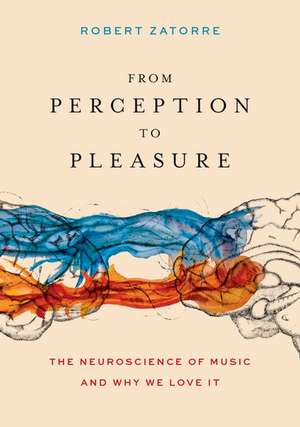From Perception to Pleasure: The Neuroscience of Music and Why We Love It
Autor Robert Zatorreen Limba Engleză Hardback – 22 feb 2024
Preț: 165.18 lei
Preț vechi: 183.33 lei
-10% Nou
Puncte Express: 248
Preț estimativ în valută:
31.61€ • 32.80$ • 26.42£
31.61€ • 32.80$ • 26.42£
Carte disponibilă
Livrare economică 13-19 februarie
Livrare express 07-13 februarie pentru 64.76 lei
Preluare comenzi: 021 569.72.76
Specificații
ISBN-13: 9780197558287
ISBN-10: 0197558283
Pagini: 368
Ilustrații: 92 color illustrations
Dimensiuni: 188 x 246 x 33 mm
Greutate: 0.95 kg
Editura: Oxford University Press
Colecția OUP USA
Locul publicării:New York, United States
ISBN-10: 0197558283
Pagini: 368
Ilustrații: 92 color illustrations
Dimensiuni: 188 x 246 x 33 mm
Greutate: 0.95 kg
Editura: Oxford University Press
Colecția OUP USA
Locul publicării:New York, United States
Recenzii
From Perception to Pleasure offers a detailed, concise, and beautifully organized account of Robert Zatorre's groundbreaking work. His research into how music impacts the brain and shapes our emotional lives is revelatory. Zatorre builds a crucial framework for fully integrating creative arts therapies into health and medicine.
Robert Zatorre is both a musician and a scientist. There is nothing surprising about his passion for music but the intelligence and persistence with which he has investigated his muse are unusual and have been astonishingly productive. A good part of what we know about the perception of music and about the pleasures music brings to the human soul comes from Zatorre's unique dedication. How fortunate we are now that he has decided to tell the story of his lifelong pursuit in an insightful book that may well produce as much pleasure as the music that inspired it.
What happens in our brain when music reaches our ears? How do neurons encode, with remarkable precision, the intricate rhythmic and tonal structures that constitute a musical stream? And above all, why do some musical pieces trigger expectation, surprise, bliss, chills and goosebumps? In this highly accessible and scientifically up-to-date synthesis, Robert Zatorre, the renowned expert of musical cognition and its brain mechanisms, dissects it all for us, to our greater enjoyment.
His pioneering book, based on profound research, is technical but always accessible.
Why do we like music so much? To find out, cognitive neuroscientist Robert Zatorre analyzes how neural circuits process different aspects of musical cognition, such as perceiving distinct pitches or imagining a tune in your head long after your first listen. Zatorre posits that our enjoyment emerges from functional interactions between circuits that control cognition, perception and our reward system. His descriptions of these interactions provide a comprehensive look at the neurobiological basis for musical pleasure.
This volume may appear slim, but it embodies an extraordinary achievement.
Robert Zatorre is both a musician and a scientist. There is nothing surprising about his passion for music but the intelligence and persistence with which he has investigated his muse are unusual and have been astonishingly productive. A good part of what we know about the perception of music and about the pleasures music brings to the human soul comes from Zatorre's unique dedication. How fortunate we are now that he has decided to tell the story of his lifelong pursuit in an insightful book that may well produce as much pleasure as the music that inspired it.
What happens in our brain when music reaches our ears? How do neurons encode, with remarkable precision, the intricate rhythmic and tonal structures that constitute a musical stream? And above all, why do some musical pieces trigger expectation, surprise, bliss, chills and goosebumps? In this highly accessible and scientifically up-to-date synthesis, Robert Zatorre, the renowned expert of musical cognition and its brain mechanisms, dissects it all for us, to our greater enjoyment.
His pioneering book, based on profound research, is technical but always accessible.
Why do we like music so much? To find out, cognitive neuroscientist Robert Zatorre analyzes how neural circuits process different aspects of musical cognition, such as perceiving distinct pitches or imagining a tune in your head long after your first listen. Zatorre posits that our enjoyment emerges from functional interactions between circuits that control cognition, perception and our reward system. His descriptions of these interactions provide a comprehensive look at the neurobiological basis for musical pleasure.
This volume may appear slim, but it embodies an extraordinary achievement.
Notă biografică
Robert Zatorre was born and raised in Buenos Aires, Argentina. He studied music and psychology at Boston University, and obtained his PhD at Brown University, followed by postdoctoral work at the Montreal Neurological Institute of McGill University, where he currently holds a Canada Research Chair. His laboratory studies the neural substrates of auditory cognition, focusing on two characteristically human abilities: speech and music. Together with his many students and collaborators he has published more than 300 scientific papers on topics including pitch perception, musical imagery, music production, brain plasticity, hemispheric specialization, and the role of the reward system in musical pleasure. In 2006 he co-founded the International Laboratory for Brain, Music and Sound Research (BRAMS). His work has been recognized by numerous international prizes, including the C.L. de Carvalho-Heineken Prize for Cognitive Science (Amsterdam) and the Grand Prix Scientifique from the Institute forHearing in Paris. He tries to keep up his baroque repertoire on the organ whenever he gets a chance.
